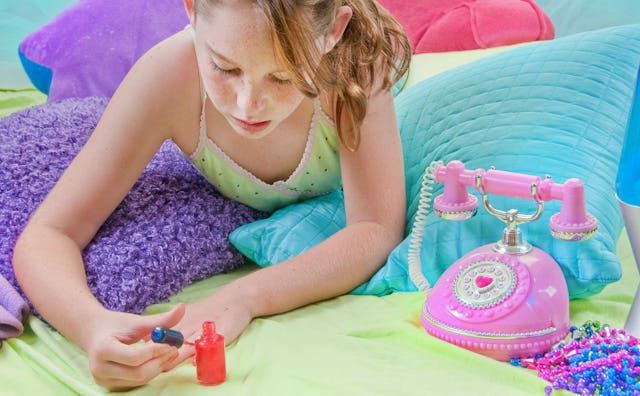A Room Of Her Own

Right on schedule, just as my daughter turned from 12 to 13, the sign went up on her bedroom door. “PRIVATE. DO NOT ENTER!!!!!” It was decorated with fruity-smelling markers and covered with daisy stickers, but the multiple exclamation marks made their point.
Over the course of her seventh grade year, the signs became clearer and cleverer. She is a Dr. Who fan, so one read “Enter at your own risk: Guarded by Daleks.” She posted a comic list of Edward Gorey-style gruesome punishments for those who dared enter her lair.
While she never actually complained when I came in, even if I did forget to knock, the signs indicated that she was busy growing up and shouldn’t be disturbed more than necessary. The space was no longer just my daughter’s room, but a Room of Her Own, Junior Edition.
At first I was sad to have been put out of the Eden of my own daughter’s childhood. But then I remembered: I want my daughters to have their space. We are unimaginably lucky to have one another, and also to have solitude when we need it. Good fences make good neighbors, and our family’s harmony improves with a few closed doors.
My older daughter started the same habit two and a half years earlier, shutting the door every night before she went to bed. Sometimes I had to knock for a long time to get her to open the door—occasionally losing patience and pounding angrily when she did not respond. I found this particularly galling because she was not yet reliably getting herself out of bed in the morning.
I sometimes asked her, in an exasperated voice: “How can you both lock me out and still need me to do so much for you?”
The question I wanted to ask, but never did, was, “Why wouldn’t you want me with you?”
However, with my second daughter, I find locked doors and aggressively punctuated hand-drawn signs so much easier to accept and respect. I’ve been through it once, and have witnessed my flesh and blood re-emerge from the tangles of adolescent weirdness. My older daughter, now on her way to 17, no longer finds me embarrassing or repugnant. She is polite and sweet, so I no longer get my feelings hurt when she requests space.
Plus, this second girl of mine is a writer, just like me. She sometimes spends entire afternoons crafting the beginning and middle of a fantasy story based on Cinderella, but with a blue-haired alien protagonist. (At her age, she’s better at beginnings than she is at finishing stories.) She writes song lyrics in the style of Carrie Underwood about crushing heartbreaks she has not yet endured. She spews out poem after poem.
So when she disappears into her room, I know that she isn’t just trying to get away from me, but get away to herself. Like Virginia Woolf, writing nearly a century ago, she understands intuitively that a woman who writes—even a very young woman—needs a place where imagination can bloom.
I get it, as I too spend entire days looking for a quiet space in which to write—away from the dishes, work emails and essential tasks. The whole place is mine—ours, really, mine and my husband’s together—which I recognize as an indescribably great fortune. But there are days I wish I had just one single room in which to write, rather than a house to tidy and tend. If I had that room, I would post a sign in marker with lots of extra punctuation: “KEEP OUT! WRITER AT WORK!!!!!!!!!” The sign on my door would not have daisy stickers.
I still sometimes intrude on my daughters, but with more experience as the mom of teenagers, my judgment is improving. I’ve learned when to insist on my rules without apology. Yes, you have to help clean up after dinner. Yes, you must fold your laundry. And no, you can’t watch New Girl before your homework is complete.
But I’ve also learned when to just let them spend hours off on their own, precisely as they see fit.
In two years, my first baby will graduate from high school. In just five years, my last will be turning from 19. Eventually they will head out into the world, ready to find and claim their own rooms, then decide how to live there. The signs will come down from their doors as they become increasingly secure in themselves as separate people.
Without daughters to feed, to wake in the mornings and to remind to fold their own socks, I’ll have plenty of time to write.
And I’m sure I’m going to miss those signs on the door.
This article was originally published on